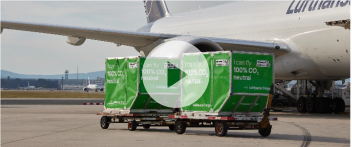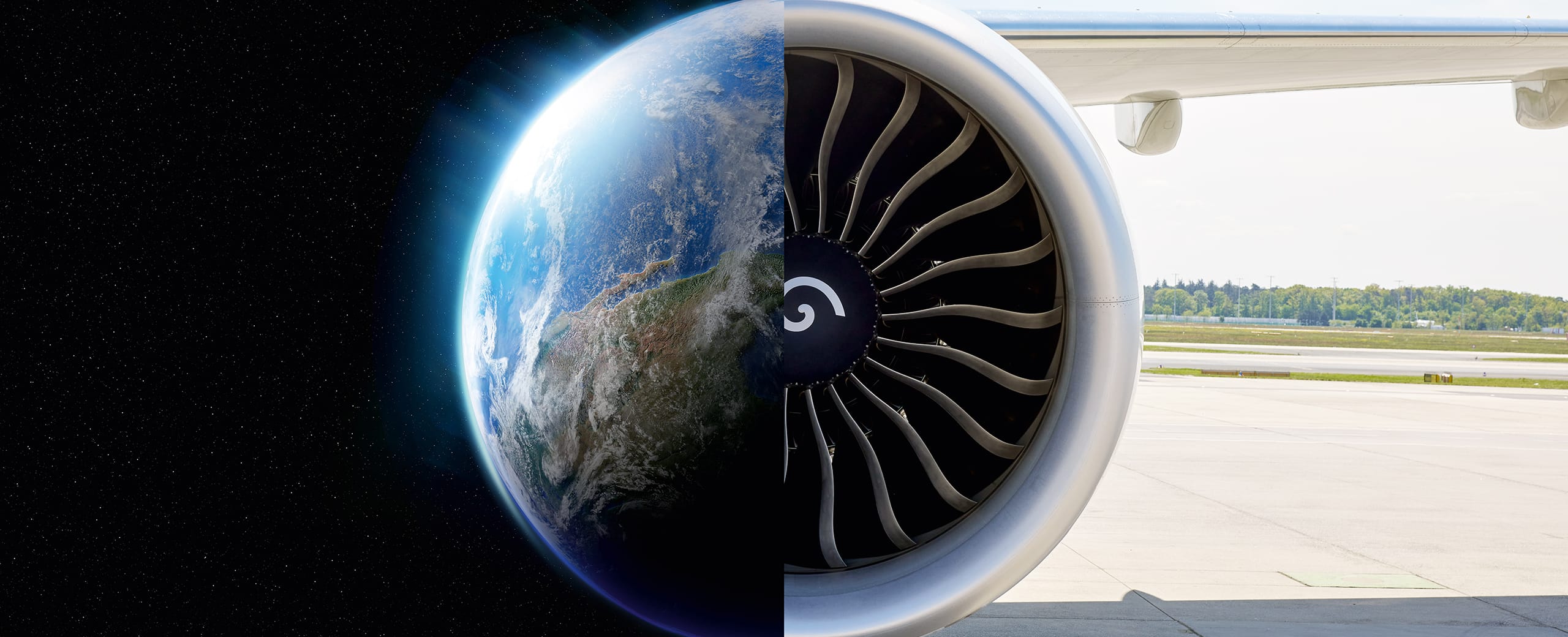
Sustainability at Lufthansa Cargo
Every action counts
We are active all over the world – and at home. That’s why global responsibility and sustainable, forward-looking practices are part of our DNA.
We are committed to the United Nations’ climate targets and to creating a sustainable infrastructure on the ground and in the air. We want to make a difference, ensure our business is both, more climate-friendly and environmentally sustainable, and advance our society.
For a better tomorrow for all of us.
Lufthansa CargoWe make a difference.
Our goal for 2050:
100% CO2-neutrality
and by 2030 on the ground!
Our goal for 2030:
50% less net CO2
than in 2019
AeroSHARK technology
and lightweight loading equipment:
5,493 t
of kerosene saved per year
Fleet modernization
in the past 25 years:
52% reduction
per TKT in CO2 emissions
Cargo Human Care:
6 institutions
for humanitarian aid in Kenya
Together for a better future
It is a matter of course for us to feel responsible for the future of our planet - but far from enough. That is why Lufthansa Cargo defined its first concrete environmental guidelines back in 2007, when it established its environmental management system. In 2012, 2016 and 2023, these were updated to give room to new impulses.
Systematic climate targets
Lufthansa Cargo is pursuing a clear strategy for a sustainable future and, together with the Lufthansa Group, has set itself ambitious climate protection targets: We are aiming for a neutral CO2 balance by 2050 and already by 2030 we want to halve our net CO2 emissions compared with 2019 through reduction and compensation measures.
- We are working to be the most efficient cargo airline in the world.
- Together with the Lufthansa Group, we have joined the Science-based Targets initiative. It has validated the reduction roadmap to 2030, which is thus in line with the goals of the Paris Climate Agreement.
- We have our corporate carbon footprint scientifically verified by independent consultants.
Specific climate action
by Lufthansa Cargo
More sustainable operations in the air and on the ground: As we are an airline, nearly 99% of our carbon footprint is caused by flying. That means our greatest CO2-saving potential lies in the air. Although our activities on the ground account for only about 1% of our CO2 emissions, we are working hard to achieve the target of CO2-neutrality in all our ground processes by 2030. In addition, we are constantly looking for new ways to avoid energy, fuel, resources and waste.
1. Fleet modernization
We continuously invest in modernizing our fleet and operate the newest and most fuel-efficient cargo aircraft on the market. Since October 2021, we have switched our longhaul fleet completely to the Boeing 777F – today’s most modern freighter with the best environmental performance. We have already placed orders for its even more efficient successor, the Boeing 777-8F, which we will start flying in 2027. The current average age of our fleet is only 6.2 years.
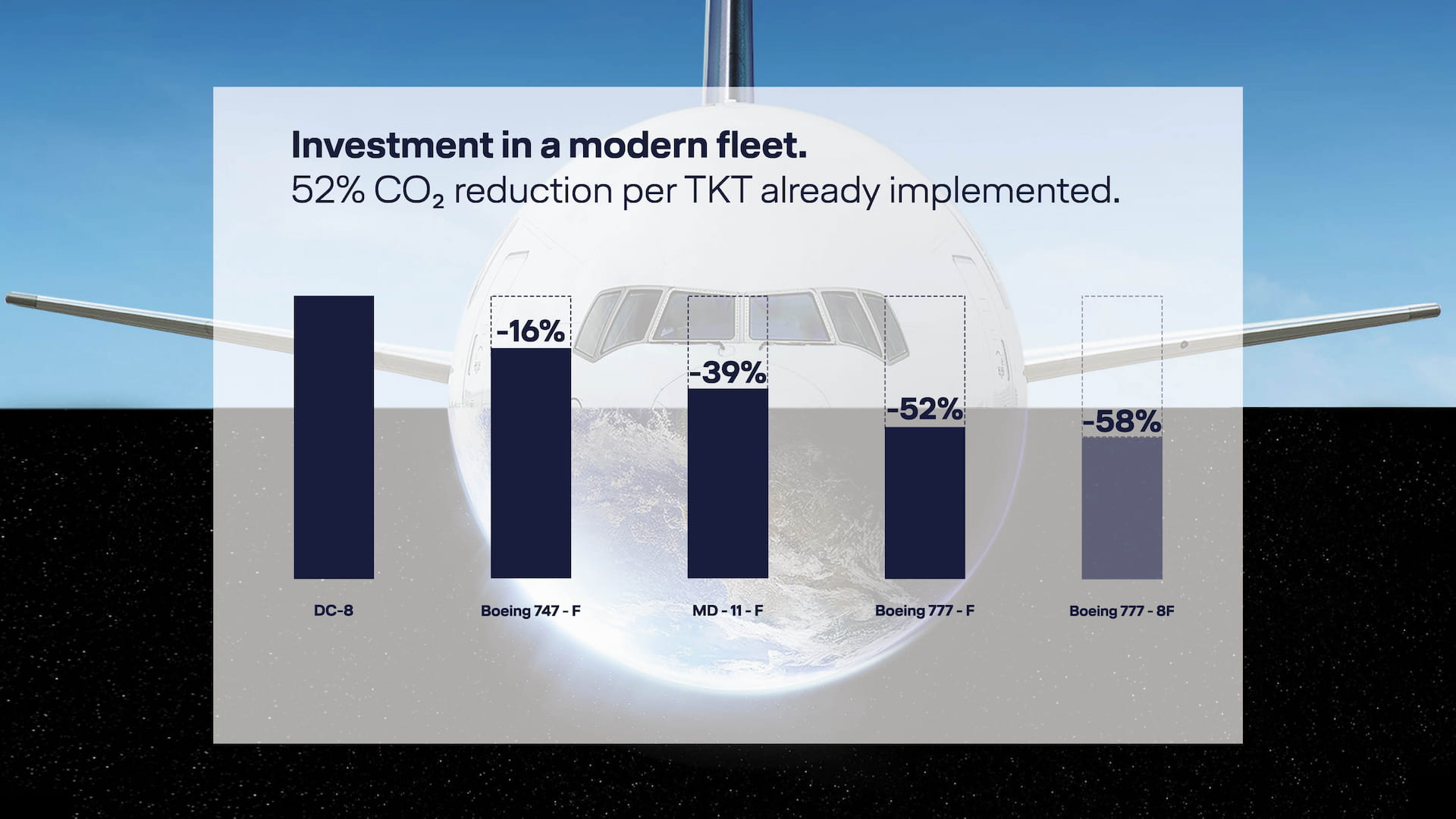
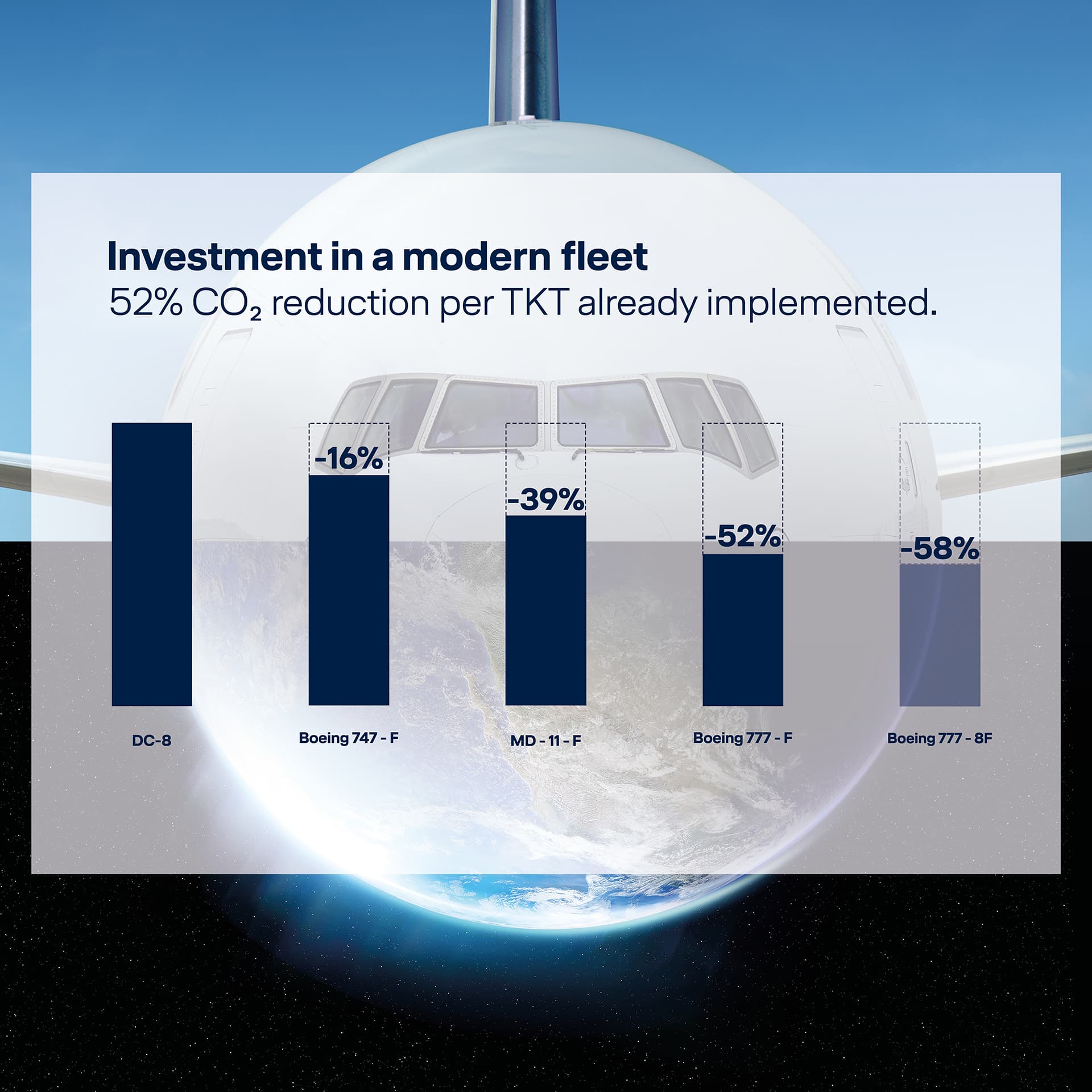
2. Fuel efficiency
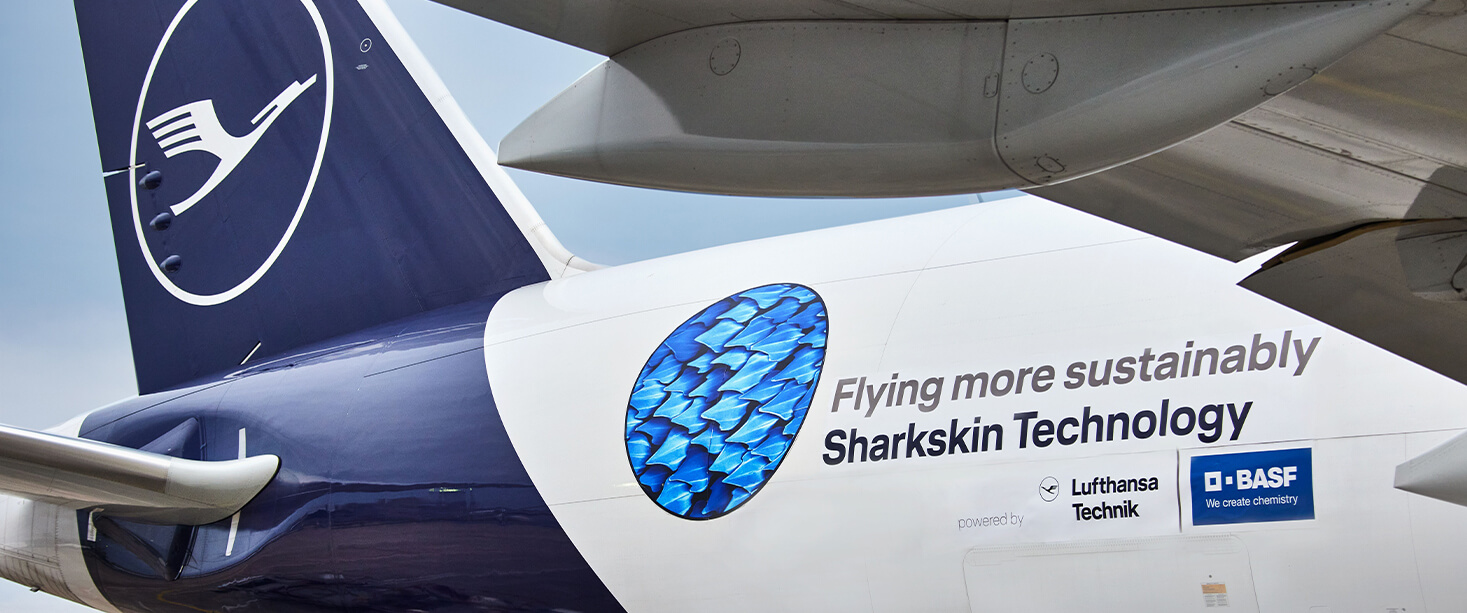
AeroSHARK technology
A special coating reduces the frictional resistance of an aircraft by about 1%. From 2023, this technology will be rolled out across our fleet of eleven Boeing 777F freighters, saving around 3,700 tonnes of kerosene or about 13,000 tonnes of CO2 emissions per year.
Less weight on board
Since 2020, Lufthansa Cargo has exclusively used lightweight containers on its flights. This has led to a weight reduction of 14 kg per container and fuel savings totaling 2,160 tonnes per year.
Lightweight containers
- more than 14 kg less weight per container
- CO2 emissions reduced by 6,800 t per year
- standard containers have been replaced and additional loading equipment is being developed
squAIR-timber
- made from 100% recycled paper and 80% lighter than wood
- 60 kg saving on pallet stacks cuts CO2 emissions by around 240 t per year (Group-wide: 450 t).
eFreight
- 100% eAWBs in 2022
- Lufthansa Cargo saves the industry around 50 t of paper
- 20 t less CO2 emitted due to reduced weight on board
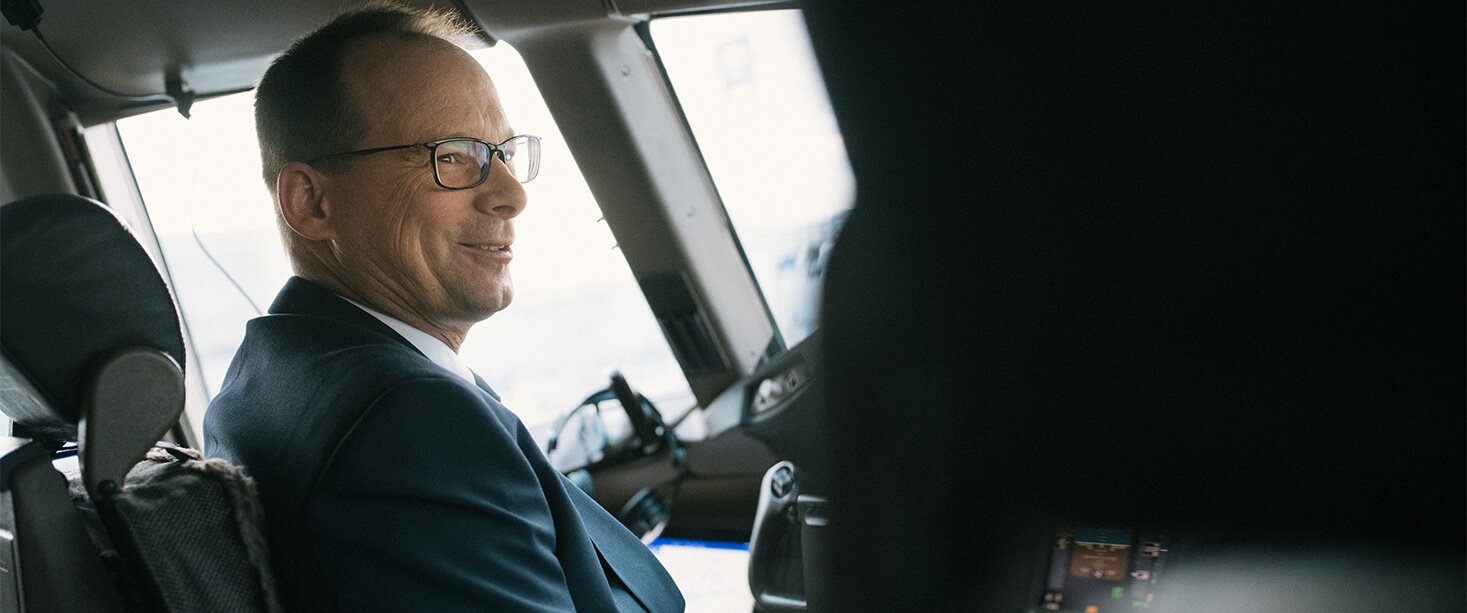
Flight optimization
In cooperation with Germany’s air traffic control service (Deutsche Flugsicherung), we use optimized flight procedures based on the efficient flight profile (EFP) concept. In addition, pilots and air traffic controllers are in constant contact in order to save fuel.
- EFP improves continuous descent rates and optimizes descent times and flight paths
- The EMAS project serves to optimize approach sequences and target landing times with the aim of enabling quieter and more efficient approaches to Frankfurt Airport at peak times
- According to the Intergovernmental Panel on Climate Change (IPCC), creating a single European airspace could reduce CO2 emissions by 5–10%
- Up-to-date weather information makes it easier to manage fuel and to plan optimum flight procedures, variable speeds, and altitudes
- Various restrictions such as air traffic regulations mean that it is not always possible to plan the shortest routes. Pilots ask air traffic controllers whether any shortcuts are currently available in the course of flights
- State-of-the-art data analysis tools such as OMEGA allow the fuel requirement per flight and the fuel reserve to be tailored to the actual circumstances
- Digitalization has reached the cockpit as well: The 25-kg case containing manuals and navigational charts has been replaced by the Electronic Flight Bag, leading to a weight reduction
3. Sustainable aviation fuels
Sustainable aviation fuels (SAF) are already enabling more sustainable flying. Compared with fossil fuels, SAF reduce CO2 emissions by up to 80%, while the remaining emissions are offset by certified environmental projects.
Lufthansa Cargo is one of the pioneers in the use of SAF:
- More than 1% of fuel used by Lufthansa Cargo aircraft in 2021 was SAF
- Nearly 2.1% of fuel used by Lufthansa Cargo aircraft in 2022 was SAF
- We currently operate the world’s only regular full charter freight connection that is 100% SAF-powered
- Together with our partner DB Schenker, we save around 174 tonnes of conventional kerosene per week

4. Offsetting
Our target is a 50% reduction in CO2 by 2030. Bottlenecks in technology that is still in the development stage, a limited supply of sustainable fuels as well a slow changes in environmental policy mean that this is only possible through contributions to high- quality climate protection projects, which make an equivalent contribution to the extent of the determined CO2 emissions – which is why we use such high-quality climate protection projects to avoid or remove CO2 in other sectors. This works because the climate benefits wherever greenhouse gas emissions are reduced.

Giving our customers a sustainable choice
We already offer our customers more sustainable options for their air freight thanks to sustainable aviation fuel and offsetting through environmental projects.
They can choose from three options:
Add-on service
More sustainable flights
High-volume booking
Our CO2 calculator
A CO2 calculator is available in our booking system, the calculations of which are based on the average annual kerosene consumption. This results from the actual load factors and flight routes of the respective previous year. The transports on the freighter Boeing 777F and the transports on the passenger aircraft are shown separately. The latter are clustered according to short-, medium- and long-haul flights.Getting there together
Our goal is to transport goods more sustainably around the world. But we can only achieve this by working with our partners and customers, as well as with producers and consumers. Come and join us on this exciting journey. Together, we can change the world.
5. Ground processes
100%
worldwide certified in accordance with ISO 14001
100%
green power in Germany, Austria, and Switzerland as the basis for 100% CO2-neutral mobility by 2030
100%
sustainable procurement criteria
We are working towards 100% sustainability
100%
eAWBs instead of paper in the logistics chain
99%
of all waste at our hubs is already recycled or used for power generation
100%
dedication to upcycling products
Strategy for plastic reduction
Our resource and waste management systems work hand in hand to ensure a closed loop. By 2025, we will implement many more sustainable solutions for plastic film in our handling operations – including life cycle extension through reuse, reduction of new plastic, and worldwide recycling solutions.
Reduce and reuse
- 15-μm thin, ultra-light film
- Multiple use of film whenever possible
Recycling
- Recycling of used materials at our hubs
Bioplastic film
- Use of biodegradable film
- Locally sourced
- Interim solutions to reduce risk
Partly recyclate-based film
- Closed loop
- Used film is returned to the manufacturer

